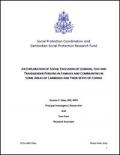Publications - Released in 2013
Social Exclusion on the basis of gender identity and sexual orientation (SOGI) is complex and may not be readily acknowledged by authorities. Other factors that can influence exclusion are poverty, illiteracy, lack of awareness about social protection mechanisms and how these can be accessed, some religious practices, cultural norms about males and females, husbands and wives, and families, and type of occupation (such as sex work); however SOGI‐based exclusion appears to be a major cross‐cutting feature that cannot be disregarded. Many LGBT are mobile and even while living together with a partner in a stable relationship, they are not officially and legally recognized as partners, a husband‐wife team, a couple, or as a family.
The study makes recommendations for policy‐makers, program planners and project implementation to consider Sexual Orientation and Gender Identity (SOGI) as crosscutting factors that can influence participation, delivery of social services, and access to education, work opportunities and justice. Awareness and Education activities on SOGI support for informal groups and associations, as well as areas for further research are recommended.






